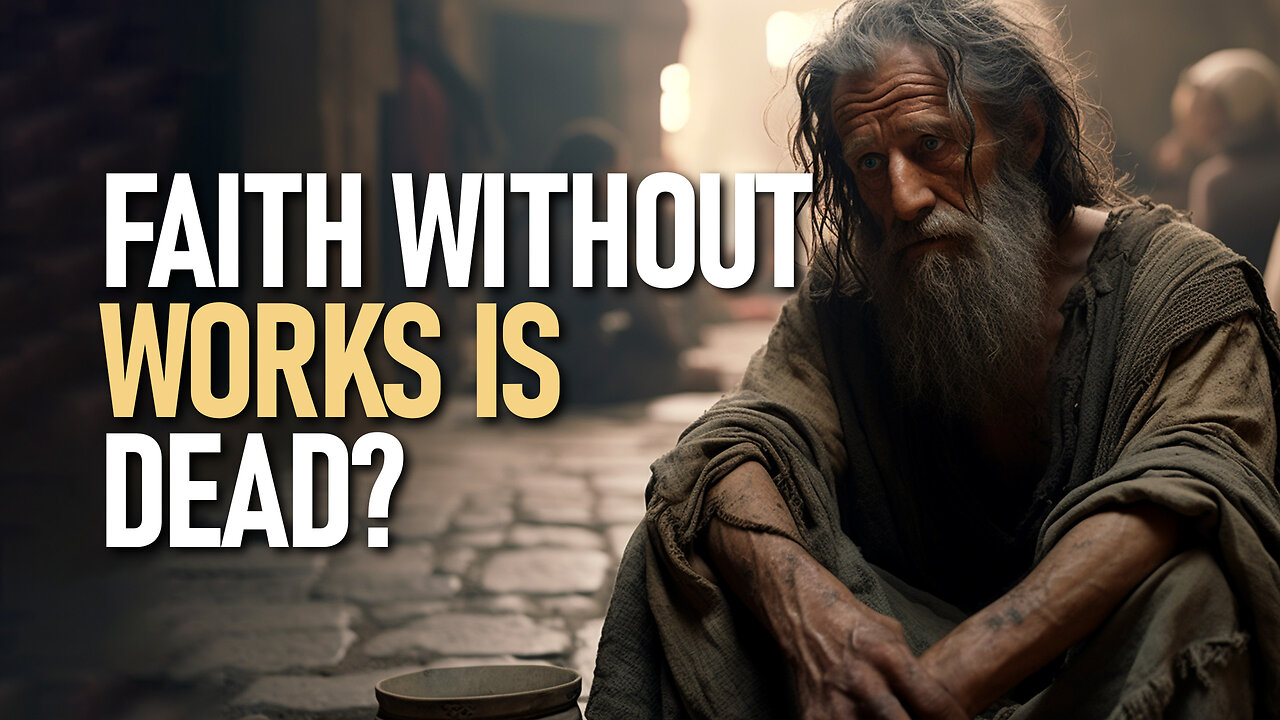Faith Without Works Is Dead | Christian Bible Study
expand_morehttps://linktr.ee/thechristianking
The verse in James 2:14-26, which discusses faith being dead without works, has been interpreted in various ways within Christian theology, particularly concerning its implications for a believer's salvation. Here's a summary of the major beliefs:
1. Reformed/Calvinist View: Perseverance of the Saints (Once Saved, Always Saved)
Belief: True believers are eternally secure in their salvation. If someone has genuine faith, it will inevitably produce good works. If a person shows no good works, it suggests that they were never truly saved in the first place.
Interpretation of James 2: James is not saying that works are necessary for salvation, but rather that genuine faith will naturally result in works. These works are the evidence of true faith. The absence of works indicates a lack of genuine faith, not a loss of salvation.
2. Arminian/Wesleyan View: Conditional Security
Belief: Salvation is a gift from God that requires ongoing faith and obedience. It is possible for a believer to fall away from faith and lose their salvation if they fail to live out their faith through good works.
Interpretation of James 2: James is warning believers that faith without works is ineffective and could lead to spiritual death. Good works are necessary as evidence of a living faith, and persistent lack of works could result in losing one's salvation.
3. Catholic View: Faith and Works Together for Justification
Belief: The Catholic Church teaches that faith and works together are necessary for justification. While faith initiates salvation, works are necessary to maintain and complete it. Grace is a free gift, but cooperation with grace through good works is essential.
Interpretation of James 2: James supports the Catholic understanding that both faith and works are necessary for salvation. Faith without works is incomplete and cannot justify a person before God.
4. Lutheran View: Faith Alone Saves, but True Faith Produces Works
Belief: Lutherans hold that salvation is by faith alone (sola fide), but they also emphasize that true faith will naturally result in good works. However, these works do not contribute to salvation; they are the fruit of faith.
Interpretation of James 2: James is addressing a misunderstanding of faith. He is not contradicting the idea of justification by faith alone but is emphasizing that true faith will be accompanied by works. If there are no works, the faith is not genuine.
5. Orthodox View: Synergy of Faith and Works
Belief: The Eastern Orthodox Church teaches that salvation is a synergistic process, involving both God's grace and human cooperation. Faith and works are inseparable in the life of a believer, contributing together to the process of theosis (becoming one with God).
Interpretation of James 2: James underscores the necessity of living faith expressed through works. Salvation is not just a one-time event but a lifelong process where faith and works together play a role in the believer's transformation and ultimate union with God.
6. Free Grace View: Faith Alone Saves, but Works are for Rewards
Belief: This view, popular in some evangelical circles, teaches that once a person has faith in Christ, they are saved eternally, regardless of whether they produce good works. However, good works are important for receiving rewards in heaven, not for maintaining salvation.
Interpretation of James 2: James is talking about the effectiveness of faith in daily life, not about eternal salvation. Faith without works is "dead" in the sense that it is unproductive and ineffective, but it doesn't mean the person loses their salvation.
7. New Perspective on Paul: Faithfulness of Jesus and Covenant Faithfulness
Belief: This scholarly perspective reinterprets Paul and James in light of first-century Judaism. It emphasizes covenant faithfulness and the faithfulness of Jesus Christ as central to salvation, rather than simply individual belief.
Interpretation of James 2: James is addressing the need for believers to live out their covenantal responsibilities. Faith is not merely intellectual assent but is demonstrated through faithful action, aligning with the Jewish understanding of covenant and law.
Summary
Faith Alone (Sola Fide): Some traditions emphasize that faith alone saves but agree that true faith will produce works.
Faith and Works Together: Others argue that faith and works are both necessary for salvation, viewing them as inseparable components of a believer's life.
Assurance vs. Conditional Security: There's a divide between those who believe a believer can have assurance of salvation (eternal security) and those who believe salvation can be lost through lack of faith and works.
Each of these views reflects a different understanding of the relationship between faith, works, and salvation, but all agree that faith without works is, in some sense, "dead" or ineffective.
#FaithAndWorks
#SalvationDebate
#BiblicalTheology
#James2
#ChristianDoctrine
#FaithWithoutWorksIsDead
#PerseveranceOfTheSaints
#ConditionalSecurity
#JustificationByFaith
#CatholicDoctrine
#OrthodoxFaith
#SolaFide
#NewPerspectiveOnPaul
#FreeGrace
https://linktr.ee/thechristianking
LIVE: Mon-Fri (5pm PT, 7pm CT, 8pmET)
Join Stage: https://vdo.ninja/?room=TheTabernacle&l&sl&sas&np&tips&avatar&g=0
Among Christianity, there exist opposing sides on this concept:
The Arminian/Conditional Security View:
Adherants of this view emphasize that once someone accepts the faith, there is a possibility of them losing salvation due to deliberate, un-repenting sins. These people offer verses from the Bible like, Hebrews 6: 4-6 and 2 Peter 2:20-22, which seem to warn against the idea that once a person is saved, they cannot become unsaved. Gone is the stress on the faithful's ability to “hold-out until the end’ and “stay put in Christ.”
This way if the person was saved in the first instance but renounces Christianity at a later overly stage, it means that the person has actually lost their salvation. There is an aspect which places a demand for continued faith and action on the part of the believer. Such trends on faith include; 1 Timothy 4:1 and Hebrews 3:12-14, which show that people with faith can lose it.
The Calvinist/Eternal Security View:
Those who hold this view believe that once a person accepts Jesus as their Lord and savior, they shall remain that way, forevermore. The basis of their argument is that a believer cannot lose their salvation because it does not depend on their effort but on God’s decision and work. John 10:28-29 and Romans 8:38-39 are some of the verses that are interpreted in the context of the security of a believer for ever.
Those who hold this view would say that if someone genuinely loses their faith, he or she was never saved in the first place. The logic goes that if salvation is based upon the will and action of God, then a believer who is a believer in every sense of the word cannot ultimately fall away. Other verses, like 1 John 2:19, suggest that apostates were never part of the true community of saints.
#SalvationSecurity #ArminiansVsCalvinists #CanChristiansLoseSalvation #EternalSecurity #ConditionallySaved #BiblicalTheology #ChristianDebates #FaithPerseverance
https://linktr.ee/thechristianking
How to apply the Sermon on the Mount today?
This is a complex theological question that different Christian denominations and scholars interpret in various ways. I'll provide an overview of the main perspectives:
Traditional Christian View:
Most mainstream Christian denominations and theologians consider the Sermon on the Mount (found in Matthew chapters 5-7) to be highly relevant for Christians today. They view it as:
A core teaching of Jesus that outlines Christian ethics and lifestyle.
Applicable to all believers, not just a specific group or time period.
A guide for how to live as citizens of God's kingdom in the present age.
Dispensationalist View:
Some Christians, particularly those adhering to dispensationalist theology, interpret the Sermon on the Mount differently:
They may see it as primarily addressed to Jews, particularly in the context of the coming Kingdom.
Some argue it applies specifically to the Tribulation period or the Millennial Kingdom.
This view suggests the Sermon contains rules for entering the Kingdom, rather than instructions for the church age.
Balanced Approach:
Many Christians take a middle ground:
They see the Sermon as having immediate relevance to Jesus' Jewish audience.
They also view it as containing timeless ethical principles applicable to all believers.
They may interpret some parts as specifically related to the Kingdom, while others are universally applicable.
#SermonOnTheMount #ChristianLiving #KingdomOfHeaven #JesusTeachings #BiblicalTruth #FaithInAction #Discipleship #BibleStudy #ChristianEthics #LiveNow
While the Bible contains regulations and guidance concerning slavery, it does not explicitly condemn the institution. Instead, it provides instructions on how slaves and masters should behave within the context of a society where slavery was a common practice. The teachings of the New Testament, particularly the emphasis on love, equality, and the brotherhood of all believers in Christ, have been interpreted by some as undermining the foundations of slavery, even though the practice itself is not outrightly condemned.
Social Media Links: https://linktr.ee/thechristianking
The concept of Sola Scriptura, which means "Scripture alone," holds that the Bible is the supreme authority in all matters of faith and practice. To evaluate whether this principle is biblical, we can look at what the Bible itself says about the authority of Scripture.
Key Biblical Passages:
2 Timothy 3:16-17:
"All Scripture is given by inspiration of God, and is profitable for doctrine, for reproof, for correction, for instruction in righteousness, that the man of God may be complete, thoroughly equipped for every good work."
This passage emphasizes the divine inspiration of Scripture and its sufficiency for equipping believers for every good work.
Acts 17:11:
"These were more fair-minded than those in Thessalonica, in that they received the word with all readiness, and searched the Scriptures daily to find out whether these things were so."
The Bereans are commended for verifying the teachings of Paul by examining the Scriptures. This indicates the importance of Scripture as the standard for evaluating teachings.
Isaiah 8:20:
"To the law and to the testimony! If they do not speak according to this word, it is because there is no light in them."
This verse suggests that any teaching must align with God's word, which reinforces the authority of Scripture.
Matthew 4:4:
"But He answered and said, 'It is written, "Man shall not live by bread alone, but by every word that proceeds from the mouth of God."'"
Jesus emphasizes the importance of living by God's word, reinforcing the primacy of Scripture.
While the term Sola Scriptura is not found in the Bible, the principle that Scripture is the ultimate authority for faith and practice is supported by various passages. These verses indicate that Scripture is inspired by God, sufficient for teaching, and the standard against which all teachings must be tested. Therefore, the concept of Sola Scriptura aligns with biblical teaching.
#belief #testimony #christiantestimony
https://linktr.ee/thechristianking
The verse in James 2:14-26, which discusses faith being dead without works, has been interpreted in various ways within Christian theology, particularly concerning its implications for a believer's salvation. Here's a summary of the major beliefs:
1. Reformed/Calvinist View: Perseverance of the Saints (Once Saved, Always Saved)
Belief: True believers are eternally secure in their salvation. If someone has genuine faith, it will inevitably produce good works. If a person shows no good works, it suggests that they were never truly saved in the first place.
Interpretation of James 2: James is not saying that works are necessary for salvation, but rather that genuine faith will naturally result in works. These works are the evidence of true faith. The absence of works indicates a lack of genuine faith, not a loss of salvation.
2. Arminian/Wesleyan View: Conditional Security
Belief: Salvation is a gift from God that requires ongoing faith and obedience. It is possible for a believer to fall away from faith and lose their salvation if they fail to live out their faith through good works.
Interpretation of James 2: James is warning believers that faith without works is ineffective and could lead to spiritual death. Good works are necessary as evidence of a living faith, and persistent lack of works could result in losing one's salvation.
3. Catholic View: Faith and Works Together for Justification
Belief: The Catholic Church teaches that faith and works together are necessary for justification. While faith initiates salvation, works are necessary to maintain and complete it. Grace is a free gift, but cooperation with grace through good works is essential.
Interpretation of James 2: James supports the Catholic understanding that both faith and works are necessary for salvation. Faith without works is incomplete and cannot justify a person before God.
4. Lutheran View: Faith Alone Saves, but True Faith Produces Works
Belief: Lutherans hold that salvation is by faith alone (sola fide), but they also emphasize that true faith will naturally result in good works. However, these works do not contribute to salvation; they are the fruit of faith.
Interpretation of James 2: James is addressing a misunderstanding of faith. He is not contradicting the idea of justification by faith alone but is emphasizing that true faith will be accompanied by works. If there are no works, the faith is not genuine.
5. Orthodox View: Synergy of Faith and Works
Belief: The Eastern Orthodox Church teaches that salvation is a synergistic process, involving both God's grace and human cooperation. Faith and works are inseparable in the life of a believer, contributing together to the process of theosis (becoming one with God).
Interpretation of James 2: James underscores the necessity of living faith expressed through works. Salvation is not just a one-time event but a lifelong process where faith and works together play a role in the believer's transformation and ultimate union with God.
6. Free Grace View: Faith Alone Saves, but Works are for Rewards
Belief: This view, popular in some evangelical circles, teaches that once a person has faith in Christ, they are saved eternally, regardless of whether they produce good works. However, good works are important for receiving rewards in heaven, not for maintaining salvation.
Interpretation of James 2: James is talking about the effectiveness of faith in daily life, not about eternal salvation. Faith without works is "dead" in the sense that it is unproductive and ineffective, but it doesn't mean the person loses their salvation.
7. New Perspective on Paul: Faithfulness of Jesus and Covenant Faithfulness
Belief: This scholarly perspective reinterprets Paul and James in light of first-century Judaism. It emphasizes covenant faithfulness and the faithfulness of Jesus Christ as central to salvation, rather than simply individual belief.
Interpretation of James 2: James is addressing the need for believers to live out their covenantal responsibilities. Faith is not merely intellectual assent but is demonstrated through faithful action, aligning with the Jewish understanding of covenant and law.
Summary
Faith Alone (Sola Fide): Some traditions emphasize that faith alone saves but agree that true faith will produce works.
Faith and Works Together: Others argue that faith and works are both necessary for salvation, viewing them as inseparable components of a believer's life.
Assurance vs. Conditional Security: There's a divide between those who believe a believer can have assurance of salvation (eternal security) and those who believe salvation can be lost through lack of faith and works.
Each of these views reflects a different understanding of the relationship between faith, works, and salvation, but all agree that faith without works is, in some sense, "dead" or ineffective.
#FaithAndWorks
#SalvationDebate
#BiblicalTheology
#James2
#ChristianDoctrine
#FaithWithoutWorksIsDead
#PerseveranceOfTheSaints
#ConditionalSecurity
#JustificationByFaith
#CatholicDoctrine
#OrthodoxFaith
#SolaFide
#NewPerspectiveOnPaul
#FreeGrace




